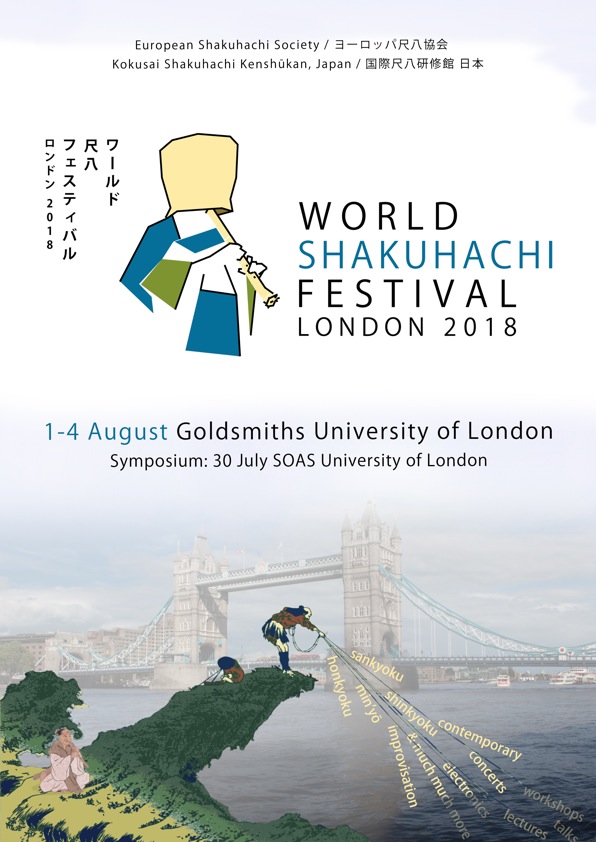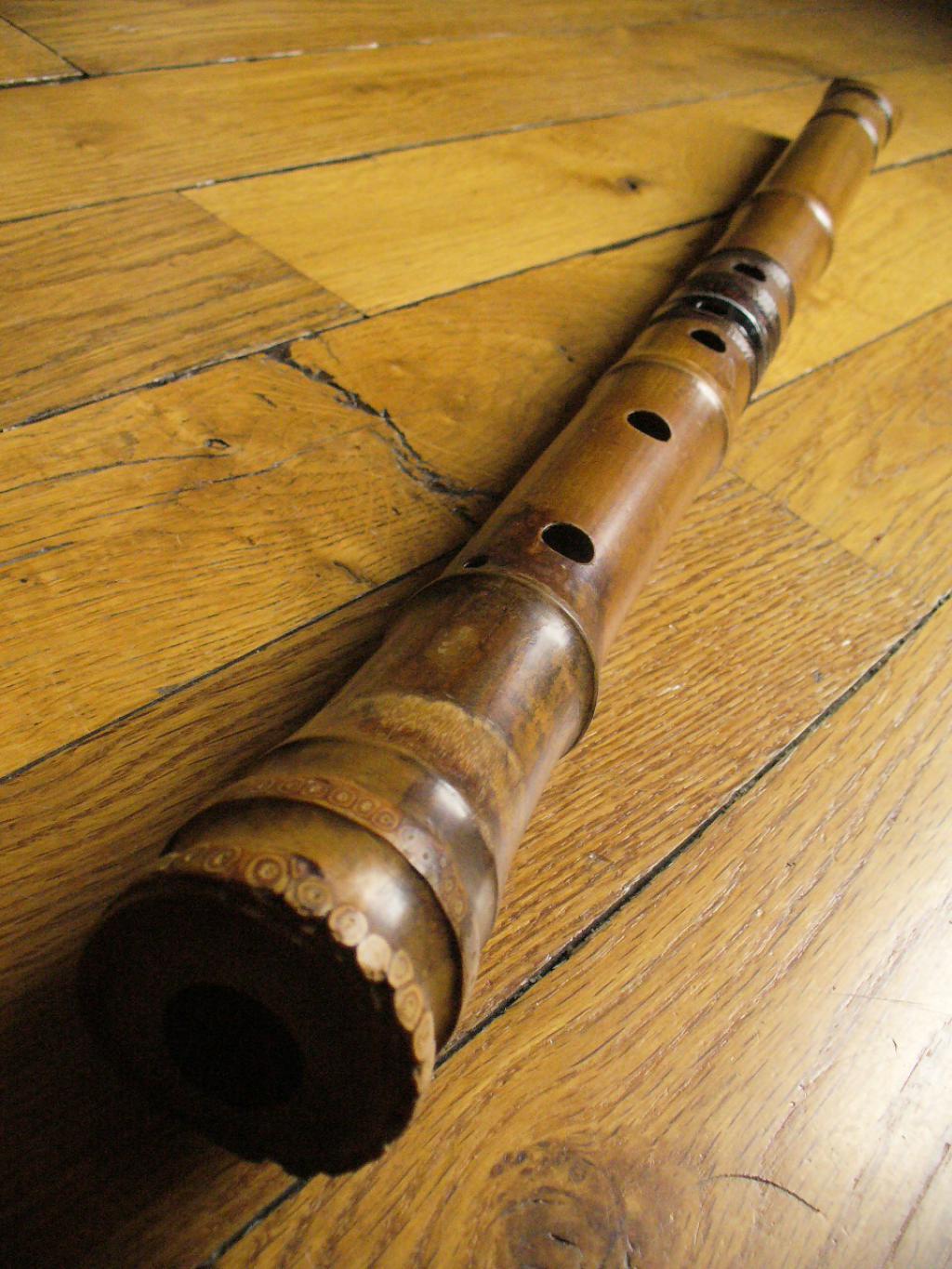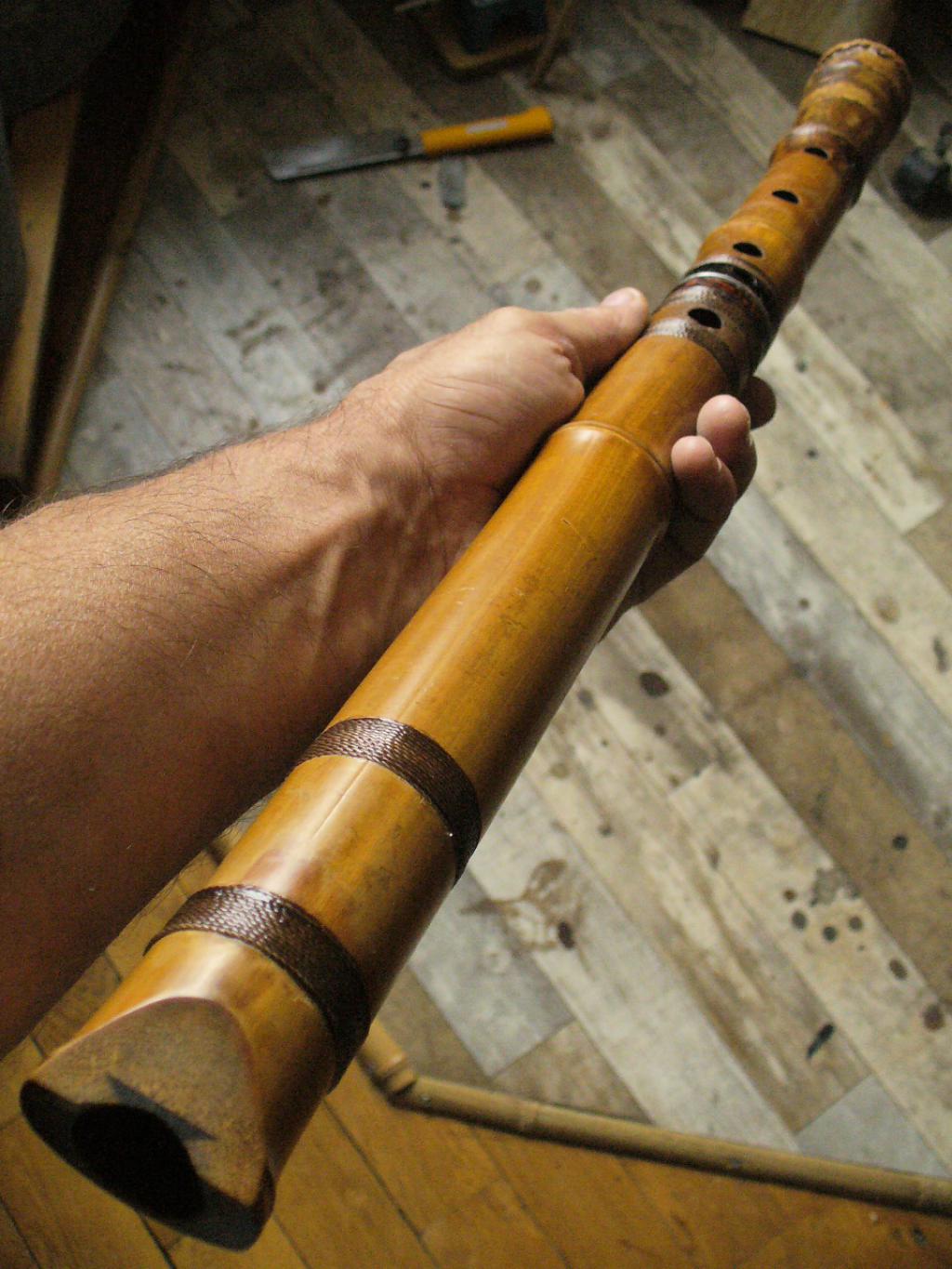Festival "Shakuhachi Taikai 2017” took place on May, 28 in Moscow, in teahouse “White crane home”. Participants were those who has an experience of playing and maybe even performing and those who just started making their sound.
Andrey Zhilin opened the Festival with master-class for beginners. He told about the history of Shakuhachi, demonstrated basic concepts and playing technics – basic notes, meri / kari, otsu / kan, vibrato. It was quite a lot for the very first lesson, but all pupils demonstrated deep involvement and interest. For the practice they could use plastic flutes made by 3D-ptinter.
Two more classes were designed for more experienced players. Dmitry Kalinin presented Honte No Shirabe (Zensabo school). Bambooway taught his own piece Arunachala Reibo. He composed this piece during his trip to sacred mountain Arunachala in India.
Master-classes took turns with concerts. Multi-instrumental performance was delivered by Andrey Zhilin (Shakuhachi), Veleslava Kholina (koto), Elena Skvortsova (violoncello). The spring marked the whole concert, they played Return of Spring / Song of sand piper, Haru No Umi / Spring sea and other.
Then performances proceeded in open mic mode. Bambooway and Sergey Ba-Zi Barunov played Ki Reibo on big flutes Hocchiku. Tatyana Rechnaya played her own piece Reibo. Dmitry Kalinin played several pieces of Koku Nishimura repertoire. Dmitry Kalinin and Tatyana Rechnaya together played Tsuru No Sugomori. Andrey Chelak played tender and powerful Tamuke. Four players – Dmitry Kalinin, Tatyana Rechnaya, Bambooway and Andrey Zhilin – played final piece Four Oaths of Bodhisattva / Sei Gan Mon.
Between concerts and master-classes participants enjoyed tea, lively discussions and exchange, tried sound on their flutes. There were also flutes for sale, and some novices left the festival with newly acquired instruments.
The event turned to be close and cozy, there were about 20-25 participants. Some reported that there were many interesting moments, and definitely they wanted more shakuhachi sounding to bring all of us in common playing space. We should remember this report for possible future events.
Thank you all who came, who played, who shared experience. Thank you wonderful “White crane home” for the right atmosphere and for the tea. May the RO be with us!
Performers and conductors of master-classes:
Andrey Zhilin, Dokyeku school
Veleslava Kholina, koto player
Elena Skvortsova, violoncello player
Dmitry Kalinin and Tatyana Rechnaya, Zensabo school (Atsuya Okuda)
Bambooway, mostly Honkyoku, flute maker
Sergey Ba-Zi Baruniv, Hocchiku
Andrey Chelak, Honkyoku style
Post: http://www.shakuhachiforum.eu/t1618-Shakuhachi-Taikai-in-Moscow-May-2017.htm
↧
↧
↧
↧
↧
↧
↧
↧
Hi,
I am not a new member here, but I would like to introduce myself again.
Recently, I have been awarded nattori shihan title by Kifu Mitsuhashi - Kimei 貴明, becoming the first European representative of his school Kifu Kai.
I teach in Prague at the studio of NEIRO Association for Expanding Arts, I am the artistic director of International Shakuhachi Festival Prague, www.isfp.cz, and event organiser in Prague.
If you are interested in leading a workshop at NEIRO, details about the festival, or would like to receive a NEIRO residency or just a sleep over for few days. Let me know, I will be there to help you.
All my best,
Marek
Post: http://www.shakuhachiforum.eu/t1624-In-Prague-a-Kifu-Kai-member.htm
↧
August 28, 2017, 10:33 am
Hi everyone,
Please find below the overview of an article I recently published on-line about a possible way to analyze honkyoku pieces and melodies. This might interest some of you.
Bruno Chikushin Deschênes, Montréal
Overview
A preliminary approach to the analysis of honkyoku, the solo repertoire of the Japanese shakuhachi
By Bruno Deschênes
Available on-line at the following web site and link:
http://nemo-online.org/archives/1674
Few authors have proposed an analysis of the melodic structure of the honkyoku repertoire. The main ones among non-Japanese are Elliott Weisgarber (1968) and Andreas B. Gutzwiller (1974). In Winter of 2017 Amy Simon published an article in the on-line journal AAWM Journal (www.aawmjournal.com). I refer in this article to Weisgarber’s and Gutzwiller’s analyses, as well as four Japanese musicologists: Koizumi Fumio, Uehara Rokushirō, Tamba Akira and Tokumaru Yoshihiko. Although these Japanese authors did not analyze honkyoku music, their works provide important cues for a better understanding on the melodic structure of these pieces. This analysis is made from the point of view of a musician who tries to understand the melodic structure of honkyoku pieces so to better perform them. I do not propose a typical musicological and methodological analysis. I rather talk about three aspects of the performance of honkyoku pieces that, as far as I know, have never been discussed. 1) Following Uehara’s and Koizumi’s theories of tetrachord, the phrases of honkyoku pieces appear to be based on kakuon, nuclear notes. I suggest instead that they are based on kakuontei, nuclear intervals. What allows us to distinguish two tones is not their distinctiveness in hearing them, but their auditory and musical relationship. The intervals are quite possibly more important than the kakuon, since they are what give movements and forms to the “trajectory” of any melody, phrase or motive. 2) When playing a honkyoku piece, a player does not simply play each phrase one after the other sequentially. He or she must group them meaningfully and aesthetically, each grouping creating larger melodic sentences. This grouping of phrases can only occur during the performance of a piece; it is not a theoretical construct. 3) Some Japanese shakuhachi masters state that honkyoku pieces are not based on pitches, notes or tones, but on tone-colors. Most analyses of Japanese music are made from a Western point of view, based on pitches. I suggest in my conclusion that analyzing them from the perspective of tone-colors provide a better grasp of these melodies. I hope this very personal take on honkyoku melodic structures will help, even if only partially, shakuhachi players to have a better understanding of the melodic structures the honkyoku repertoires, though what I am proposing here does not apply integrally to all repertoires.
For those who can read French, I published in 2017 the first book in French entirely dedicated to the shakuhachi: ‘Le shakuhachi japonais, Une tradition réinventée’ (Paris, L’Harmattan, 2017 - http://www.editions-harmattan.fr/).
Post: http://www.shakuhachiforum.eu/t1625-New-article-analysis-of-honkyoku.htm
↧
September 5, 2017, 7:11 pm
↧
↧
September 18, 2017, 1:35 am
↧
September 22, 2017, 10:45 am
↧
September 27, 2017, 4:17 pm
↧
September 28, 2017, 3:24 am
Hi everybody
I am working on a 2.15 Jinashi flute (with a few spot adjustments) and got both octaves pretty much in tune, except Ro Dai Khan is too low by 50 cent. I tried all kinds of spot tuning to get it higher but it won't budge. Any suggestions?
thanks
Adi
![Rolling Eyes]()
Post: http://www.shakuhachiforum.eu/t1630-Ro-Dai-Khan-tuning.htm
↧
↧
↧
October 2, 2017, 10:02 am
Hi everyone, I have not been on this forum for a very long time. I have studied regularly with Michael Chikuzen Gould for about 8 years now and you can probably contact him as a reference. I purchased this flute from Ronnie Seldin in 2010, and I have not really played it for several years and just bought a new 1.8 that I need to pay for so I am selling it. I am listing it on eBay and will give at least a 15% discount to anyone who contacts me directly from this forum. I have a copy of an email fro Ronnie that describes this flute as one of a few he made as a 10 years study to recreate a moder meian style shakuhachi. It is a big bore flute with just a little ji. Prior to Ronnie having it, it was owned by Stephan Nyoyoh Scholle and reparied by Perry Yung ( it was on Perry's blog from 2010 ). Please contact me if you have any questions. Thanks for the bandwidth.
Post: http://www.shakuhachiforum.eu/t1631-Kono-Gyokusui-1-8-for-sale.htm
↧
October 8, 2017, 12:00 pm
Here is an old (pre-war?) 2.0 ji-ari transformed in seven holes. i haved restored it (Bounded, polished roots, made some laquer around holes etc...
but don't touch the inside: shappe is very good, urushi too...has two stamps of his maker : Akihiro
all detail, pictures and soon MP3 on my blog: bamboushakuhachi.com
http://www.shakuhachibambou.com/20-ji-ari-akitahara-deux-signatures
An original beautifull old man with almost modern pitch( C for A at 438 htz)
i'm asked 450€ + sending post..paypal possible
:Il s'agit d'un très ancien bambou que je viens de rénover.
Visiblement , à ses tintes chêne foncé allant jusqu'au brou de noix, le bambou doit avoir plus de 80 ans.
A sa livraison, il est sale, les racines sont à peine polies, le joint fonctionne bien mais n'est pas plane, l'utagushi comporte une légère fente, une légère fente est visible près du joint, et le bambou comporte pas mal de marques d'usures et accrocs: il ressemble à un bambou de maitre modifié en 7 trous mais avec un soin approximatif apporté à son aspect..visuel .
En revanche la perce est superbe, l'urushi de très bonne qualité...et au jeu c'est un excellent joueur accordé en Do pour La autour de 438htz avec deux henko (signatures) de son fabricant: Akihiro
Je n'ai pas changé l'insert celui-ci fonctionnant très bien malgré sa micro fente, conservé le joint d'origine simplement en en abrasant les bord externes (près des ligatures), fait des petites retouches de laques au bord des trous et près de l'encoche, achevé une emprunte de ligature incrustée non effectuée près de l'encoche, et ajouter ainsi 5 ligatures semies-incrustées: en haut , ainsi que trois autres du joint ou apparaissait une légère fente non-pénétrante de 1,5 cm.
J'ai polis la peau aux endroits détériorés et au niveau des racines.
C'est maintenant un bon ji-ari 7 trous qui conserve ses qualités de jeu originales (puissance, rondeur, justesse, beaux aigus) , est maintenant sécurisé et conserve un aspect artisanal semi "brut"avec une patine affinée
All details on my blog, here: http://www.shakuhachibambou.com/20-ji-ari-akitahara-deux-signatures![]()
![]()
For sale 450€+ sending post..paypal possible, ask for mp3
A vendre 450€ garanti anti-cracks bambou/insert de 10 ans, avec son chapeau cuir
Post: http://www.shakuhachiforum.eu/t1632-2-0-Akihiro-two-stamps-for-sale.htm
↧
October 11, 2017, 10:03 am
Shingetsu (Shugetsu Yamaguchi) 2.4 jiari shakuhachi. The flute has an ivory utaguchi, red lacquer in the bore, and a solid feel (not a light flute, but not unexpected for a jiari flute of this size).
This is a powerful flute that is most suited to Dokyoku, Yokoyama-style of playing from Watazumi / Kinko-ryu, traditional honkyoku and modern settings. It has a tremendous potentiality in it muraiki and has a full, rich, and deep sound.
The flute was repaired before I purchased it by Perry Yung due to the crack you see that runs from the top down the back. The crack moved about 1/2 mm in the years I have owned it, with stable humidity control. The flute had had an air leak that I fixed with a surface binding (fishing line). The flute plays wonderfully.
Only selling due to financial issues that need to be settled. Feel free to inquire about the flute if you have questions.
Shipping is free internationally.
$2,200
Post: http://www.shakuhachiforum.eu/t1633-2-4-Jiari-Shugetsu-Yamaguchi.htm
↧
↧
October 11, 2017, 10:08 am
This is a wonderful flute with vintage nuance that is very well suited to Kinko techniques, but will produce Dokyoku techniques as well, with some adjustment. The flute has good volume and that kind of character of sound that you only find with vintage flutes of this era- one could say that it has an "authentic" sound. It is light and thin. It is in excellent condition.
$2750
Post: http://www.shakuhachiforum.eu/t1634-2-0-pre-war-Kinko-Shingetsu.htm
↧
October 18, 2017, 3:59 pm
BUY DRIVING LICENSE, PASSPORT, ID, VISA
(universalpasport@yahoo.com)
Whatsapp only +1(518)261-0913
Drivers License, ID, Degree, Passport.
Buy your driver license in Australia (Australia)
Buy Canadian pilot licenses (Canada)
Buy your driving license French (France)
French(France) passports,
German(Germany) passports,
Dutch(Netherland/Holland) passports
Whatsapp only +1(518)261-0913
Skype............US traveler
Post: http://www.shakuhachiforum.eu/t1635-Get-passport-Drivers-License-Whatsapp-1-518-261-0913.htm
↧
October 23, 2017, 5:22 am
↧








